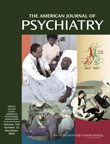Coping and Survival in Lung Cancer: A 10-Year Follow-Up
Abstract
OBJECTIVE: Little evidence is available to clarify the influence of psychological variables on the outcome of cancer. The authors studied whether style of coping was predictive of survival in lung cancer. METHOD: A cohort of 103 patients newly diagnosed with cancer was followed for 10 years. Coping was assessed before treatment by using both self-reports and interviewer ratings. RESULTS: In a survival analysis with adjustment for known biomedical prognostic factors such as tumor stage, histological classification, and Karnofsky performance status, a depressive coping style, assessed by patients’ self-reports, was linked with shorter survival (relative risk=1.91), and an active coping style, as assessed by interviewers’ ratings, was linked with longer survival (relative risk=0.72). CONCLUSIONS: These results support the hypothesis that style of coping predicts survival in lung cancer. The observational design of the study, however, precludes any causal interpretation.



